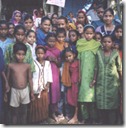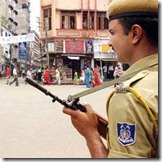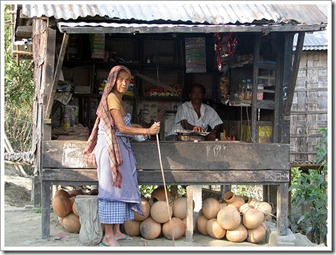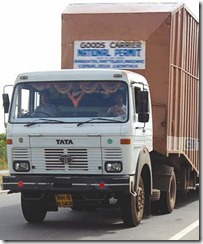In a remote corner of rural India, a new experiment using mobile phones is bringing people news made by local villagers. The BBC's Geeta Pandey travels to Rajnandgaon district in the central state of Chhattisgarh to see who is tuning in.

There is little access to independent news in remote rural areas
A group of villagers sit on a shaded platform on a hot afternoon in Mirche village.
The topic of discussion today is the Mongra barrage - a dam-like structure constructed on the nearby Shivnath river.
The conversation is animated. The villagers discuss the displacement the barrage has caused and the lack of compensation from the authorities.
"It's been four years since the dam was built. Where is our compensation," asks Lal Sahu? The anxiety lines his forehead.
"[The state Chief Minister] Raman [Singh] says there is no shortage of money, then what's the problem? We must get adequate compensation soon," he adds.
Citizen reporters
The list of grievances goes on.
"Some villagers have got compensation but many are not included in the list of the affected.


 The government says it's working for the development of the poor, but it appears they are working for our destruction.
The government says it's working for the development of the poor, but it appears they are working for our destruction. 
Budhan Meshram, folk singer
"There is also a lot of corruption. People who have not lost land are included for compensation, but many who have lost land are not on the list," says Anant Ram Nirmarkar.
Listening to their complaints and grievances are Bhan Sahu and Budhan Meshram, who are "reporters" or "citizen journalists" for CGnet Swara (Chhattisgarh Net Voice).
CGnet is an attempt to cater to people who are on the wrong side of the digital divide, says Shubhranshu Choudhary, a former BBC journalist-turned-activist and the brain behind CGnet Swara.
"We are providing a new platform which the villagers can use to talk to each other and the outside world about issues that are important to them," he says.
A few years ago, a Delhi-based media research agency, Charkha, did a survey and came up with the finding that only 2% of space in mainstream media was dedicated to covering the livelihood issues of India's largely poor and overlooked tribals.
Mobile connectivity
In this remote land, newspapers have not caught on as literacy rates are abysmal, there is no internet or private television and the only sources of news are the state-run TV channel Doordarshan and All India Radio.
"But we see that even in rural and tribal areas, mobile penetration is high and is continuously growing," Mr Choudhary says.

CGnet Swara is Shubhranshu Choudhary's idea
So he came up with the idea of news on mobile phones, to see if they could be used as a platform for information-sharing in poor and unconnected areas.
And the technology, developed by Microsoft Research India and Massachusetts Institute of Technology, is simple.
"Reporters" call a Bangalore number to upload a news item and a text message goes out to all the phone numbers in the contact list and anyone who wants to hear the report calls in to the same number and the message is played out.
In Mirche village, Budhan Meshram, Bhan Shah and other villagers crowd around a mobile phone as one of them dials in for the latest news.
Annoyed
"All Chhattisgarh legislators have gone to Haridwar to take part in the Kumbh festival at the government expense," informs the day's top report.
The report has touched a chord and the audience is clearly annoyed.
"The government says it's working for the development of the poor, but it appears they are working for our destruction," says Budhan Meshram.
Budhan, a low-caste Dalit illiterate folk singer, has been using CGnet Swara to upload songs on contemporary social issues. Today she is singing about her favourite topic - displacement.
Why should we leave?
This land, this forest, this river is ours
Capitalists - leave
The government may be yours, the law may be yours, the police may be yours, but we will not keep quiet, we will keep fighting
We looked after this land
We cared for this forest
We worshipped these rivers
Why should we leave?
She sings this to much applause.
CGnet was launched in February and Mr Choudhary says the response has been overwhelming.

Bhan Sahu (right) is a 'citizen journalist' for CGnet
"Initially we were wondering why would a person call Bangalore to upload or hear news? But we were surprised by the response.
"One of our contributors said she spent 20 rupees to upload a message. She lives in a remote area where the phone connectivity is not great. She has to try three to four times to be able to record her message. But she records messages regularly," he said.
Budhan Meshram says this is an area where few people turn to television or radio for news.
"Many people here have television sets, but they mostly watch soaps and films on them. What passes for news in mainstream media is anyway just government propaganda."
Bhan Sahu argues that the issues that concern the poor are never covered.
"No-one has given any information about the Mongra dam and the displacement it has caused in 14 villages. I want the voice of the poor to reach the people through my report."
With CGnet, these villagers have found a new voice - their own voice.
And they are tuning in to hear their own take on events in large numbers.
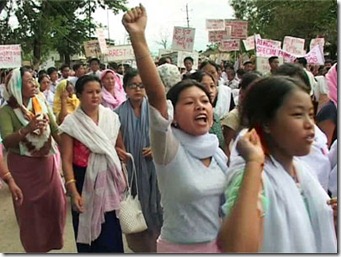 Imphal, Apr 26 : For many decades, Manipur has been facing the brunt of militancy, the result - huge social and economic losses. To discuss the situation in the state, intellectuals came together on a common platform under the banner of `Peace Dividends’.
Imphal, Apr 26 : For many decades, Manipur has been facing the brunt of militancy, the result - huge social and economic losses. To discuss the situation in the state, intellectuals came together on a common platform under the banner of `Peace Dividends’.




